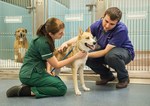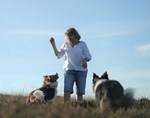Search - News & Events
21 - 30 of 67 results
-
World first, RVC finds cognitive impairments in dogs with epilepsy
A series of pioneering research studies from the Royal Veterinary College (RVC) into dogs with epilepsy have revealed that: Dogs with epilepsy find it harder to obey commands, are slower to learn new tricks, have spatial memory deficits and are easily distracted. Aversive training methods, such as bark-activated collars, prong collars and verbal punishment are associated with poor trainability and their use should be avoided. Some anti-epileptic drugs (the medications commonly used to treat seizures) were found to worsen the cognitive impairment of dogs with epilepsy. Dogs with greater exposure to training activities, including obedience classes, agility, and gun-dog training, were found to be associated with higher trainability and have fewer signs of cognitive dysfunction.You can’t teach epileptic dogs new tricks? A series of pioneering research studies from the Royal …
-
RVC study sets the agenda for the future of canine epilepsy research
RVC study sets the agenda for the future of canine epilepsy researchA new study, conducted by the Royal Veterinary College (RVC), has identified improving drug …
-
Is It Puppy Love? RVC Needs Families For An Investigation Into Impact Of Pet Dogs On Children’s Mental Health During Pandemic
The Royal Veterinary College (RVC) has launched a new study, ‘Pandemic Pals’, to explore how the ownership of dogs during the Covid-19 pandemic impacted the mental health and wellbeing of children. This study explores relationships between dogs and …The Royal Veterinary College (RVC) has launched a new study, ‘Pandemic Pals’, to explore how the …
-
New RVC research debunks belief that designer crossbreed dogs are healthier than purebreds
The RVC has undertaken the world’s largest study into the health of designer crossbreed dogs and revealed that the overall health of three common designer crossbreeds (Cockapoo, Labradoodle and Cavapoo) is largely similar to their parent purebred … -
New research from the RVC identifies impact of owner perceptions on brachycephalic dog welfare reforms
One in seven owners of extreme brachycephalic dogs stated that ‘nothing’ could put them off buying a brachycephalic dog. A new study from the Royal Veterinary College (RVC) has identified key perceptual barriers to improving the welfare of …One in seven owners of extreme brachycephalic dogs stated that ‘nothing’ could put them off buying …
-
The RVC calls for vets to participate in survey to help shape the future of epilepsy research
The Canine Epilepsy Research team at the (RVC is calling for general practice vets to participate in a vital survey being conducted on canine epilepsy therapiesThe Canine Epilepsy Research team at the Royal Veterinary College (RVC) is calling for general …
-
Health and Welfare of Brachycephalic (Flat-faced) Companion Animals - New Book Available to Pre-order
Dr Rowena Packer and VetCompass' Dr Dan O'Neill edit new book about brachycephalic health and welfare Health and welfare issues of brachycephalic (flat-faced) animals are one of the most pressing problems facing companion animals right now. Dogs, … -
RVC study into canine epilepsy helps owners identify triggers and predict seizures before they happen
An important step in helping dog owners to have advance warning of seizures, but also to identify the triggers that can be avoided to help reduce the number of seizures their dog experiencesAn international study, which recruited owners of dogs diagnosed with epilepsy, has revealed …
-
Study reveals substantial negative impacts on owners’ lives when their dog develops epilepsy
The qualitative study, led by the RVC, explored the impact of owning a dog with epilepsy, aiming to provide better support and resources to help improve owner quality of lifeA study led by the Royal Veterinary College (RVC), which explored the impact of owning a dog with …
-
RVC Research study reveals consequences of extreme demand for puppies during COVID-19 Pandemic
RVC study reveals why so many people bought puppies during the pandemic and the consequences of this extreme demand










